#stephen manna
Text






Stevie Richards & Victoria
#wwe#wwf#wwe victoria#stevie richards#lisa marie varon#tna tara#stephen manna#attitude era#ruthless aggression#00s#tag team#couple#love#gifset#wwe gifs
113 notes
·
View notes
Text
TOMORROW!!! 🥺




Strange (2022) #10.
Writer - Jed MacKay.
Artist - Marcelo Ferreira.
Cover Artists - Lee Garbett, Francesco Manna, Neatease, Iban Coello.
#Jed MacKay#Marcelo Ferreira#Lee Garbett#Francesco Manna#Neatease#Marvel Duel#Iban Coello#Clea#Clea Strange#Doctor Strange#Stephen Strange#The Harvestman#Wong#Bats#Doctor None#Marvel#Marvel Comics#Comics#Comic Books#Comic Art#Cover Art#Art#Variant Cover#Marvel Heroes#Marvel Villains#Heroes And Villains#Faltine#Sorcerer Supreme#Sorceress Supreme#Strange 2022
12 notes
·
View notes
Text
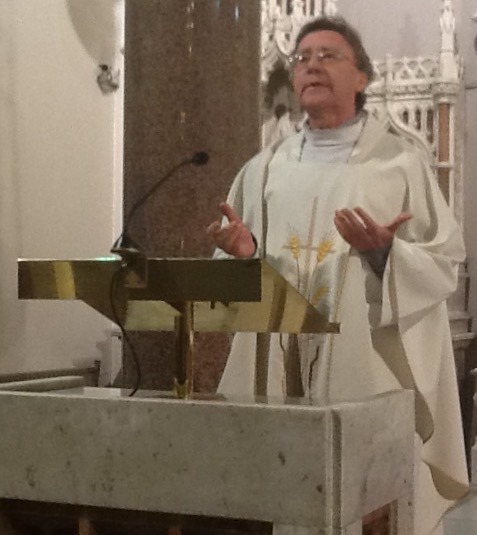
16th April >> Fr. Martin's Reflections / Homilies on Today's Mass Readings (Inc. John 6:30-35) for Tuesday, Third Week of Easter: ‘I am the bread of life'.
Tuesday, Third Week of Easter
Gospel (Except USA)
John 6:30-35
It is my Father who gives you the bread from heaven.
The people said to Jesus, ‘What sign will you give to show us that we should believe in you? What work will you do? Our fathers had manna to eat in the desert; as scripture says: He gave them bread from heaven to eat.’
Jesus answered:
‘I tell you most solemnly,
it was not Moses who gave you bread from heaven,
it is my Father who gives you the bread from heaven,
the true bread;
for the bread of God
is that which comes down from heaven
and gives life to the world.’
‘Sir,’ they said ‘give us that bread always.’ Jesus answered:
‘I am the bread of life.
He who comes to me will never be hungry;
he who believes in me will never thirst.’
Gospel (USA)
John 6:30-35
It was not Moses, but my Father who gives you the true bread from heaven.
The crowd said to Jesus: “What sign can you do, that we may see and believe in you? What can you do? Our ancestors ate manna in the desert, as it is written:
He gave them bread from heaven to eat.”
So Jesus said to them, “Amen, amen, I say to you, it was not Moses who gave the bread from heaven; my Father gives you the true bread from heaven. For the bread of God is that which comes down from heaven and gives life to the world.”
So they said to Jesus, “Sir, give us this bread always.” Jesus said to them, “I am the bread of life; whoever comes to me will never hunger, and whoever believes in me will never thirst.”
Reflections (12)
(i) Tuesday, Third Week of Easter
More than once in the gospels, people come to Jesus asking him to perform a sign before they will take him seriously. In today’s gospel reading people ask Jesus, ‘What sign will you give to show us that we should believe in you? What work will you do?’ This is immediately after Jesus had done the work of feeding a large crowd with five barley loaves and two fish. Here was a work that was a sign for those with eyes to see. This work pointed beyond itself to Jesus’ true identity. His feeding of the crowd with bread and fish was a sign that Jesus was ‘the bread of life’ in the language of today’s gospel reading. The real significance of Jesus’ miraculous work of the crowd lay in what it has to say about who Jesus is for all those who believe in him. The crowd who were fed would become hungry again, however, Jesus remains the bread of life for all who come to him, not just during his public ministry, but for all future generations who will come to him as risen Lord. Jesus is our Bread of Life today. The promise he makes in today’s gospel reading is made to each one of us, ‘those who come to me will never be hungry; those who believe in me will never thirst’. The risen Lord promises to satisfy the deepest hungers and thirsts in our heart, the hunger and thirst for love, for forgiveness, for justice, for peace, for communion, for life to the full. There is a sense in which those deeper hungers and thirsts will only be fully satisfied at the heavenly banquet in the kingdom of God. However, Jesus’ promises pertains not just to the ultimate future but also to the present. Here and now, in our own place and time, he is bread of life for all who believe in him and for all who come to him. We encounter the Lord as Bread of Life in a special way at the Eucharist, yet the Lord’s invitation to come to him as Bread of Life is not limited to the Eucharist. He is our daily bread of life, in every place and time.
And/Or
(ii) Tuesday, Third Week of Easter
In this morning’s first reading, Stephen is stoned to death by those who found his preaching offensive. Luke who wrote the Acts of the Apostles portrays Stephen’s way of dying in a manner that would call to mind how Jesus died. As Jesus on the cross prayed, ‘Father, into your hands I commend my spirit’, Stephen prays to the risen Jesus, ‘Lord Jesus, receive my spirit’. As Jesus on the cross prayed, ‘Father, forgive them, for they do not know what they are doing’, Stephen prays to the risen Jesus, ‘Lord, do not hold this sin against them’. In other words, Luke presents Stephen as having the same relationship with Jesus that Jesus has with his heavenly Father. We are all called to have the same relationship with Jesus that Jesus has with his Father. Jesus’ intimate relationship with God his Father is to be the model of our relationship with Jesus. In the gospel reading this morning from the gospel of John, Jesus invites us into this intimate relationship with himself. He offers himself to us as the bread of life and calls on us to come to him, to believe in him, so that our deepest hunger will be satisfied and our deepest thirst quenched. We spend our lives responding to this invitation. The coming to him that believing in him involves is a constant coming; it is the journey of a lifetime, a journey into an ever deeper and more intimate relationship with the Lord. A little on in John’s gospel Jesus expresses the nature of this journey in another form when he calls on us to abide in his love, just as he abides in his Father’s love.
And/Or
(iii) Tuesday, Third Week of Easter
We have become very aware in recent times of the persecution of Christians in parts of the Middle East and in other parts of the world. It appears that Christians have no future in territories that are currently controlled by ISIS in particular. Huge numbers of believers have been put to death, simply because they profess the name of Jesus. It has been said that there are more Christian martyrs in these years than at any time in the church’s history. Today’s first reading from the Acts of the Apostles is Luke’s account of the death of the first Christian martyr, Stephen. According to Luke, Stephen’s way of dying reflected how Jesus died. As Jesus entrusted his spirit to God, Stephen entrusted his spirit to the risen Lord. As Jesus died with a prayer asking God to forgive those responsible for his death, Stephen died asking the risen Lord not to hold the sin of his executioners against them. Jesus and Stephen died as they lived. They show us not simply how to die but how to live. We too are to live, entrusting ourselves to the Lord and revealing his love and mercy to those we meet, including those who sin against us. If we are to live in this way, we need the Lord’s help. We need to keep on receiving the Lord into our lives as Bread of life, in the words of Jesus in this morning’s gospel reading.
And/Or
(iv) Tuesday, Third Week of Easter
The children who make their first Holy Communion are familiar with the term ‘bread of life’ that Jesus uses with reference to himself in this morning’s gospel reading. They understand that what they receive is bread, but it is not ordinary bread; it is the bread of life. When Jesus says, ‘I am the bread of life’, it is the first of seven ‘I am’ expressions that Jesus uses with reference to himself in the fourth gospel. He will go on to say, ‘I am the light of the world’, ’I am the gate’, ‘I am the good shepherd’, ‘I am the resurrection and the life’, ‘I am the vine’, ‘I am the way, the truth and the life’. The fact that the fourth evangelist has Jesus speak of himself in this way seven times is not by accident. The number seven in the biblical world is always a symbol of completion or fullness. Each time Jesus uses any of these seven expressions with reference to himself in this gospel, he is identifying himself as God’s life-giving presence in human form. More specifically, in declaring himself to be the Bread of Life, he is saying that he alone can satisfy the deepest hungers of the human heart. That is why Jesus’ invitation to us in this gospel of John is the simple invitation, ‘Come’, ‘Come and see, ‘Come and eat’. We spend our earthly lives trying to respond to that life-giving invitation.
And/Or
(v) Tuesday, Third Week of Easter
Chapter 6 of John’s gospel from which we are reading all this week is very much a Eucharistic chapter. Unlike the other three gospels, John’s gospel has no account of the actual institution of the Eucharist, but it does have this wonderful chapter, which is unique to this gospel and which is full of Eucharistic themes. In this morning’s gospel Jesus contrasts the bread with which the people of Israel were fed by Moses on their way through the wilderness en route to the promised land with the true bread, the bread of God, which is given not just to the people of Israel but to the world. What is this true bread, this bread of God? Jesus goes on to identify himself as this bread, ‘I am the bread of life’, he says. Jesus gives himself to us as the bread of life on our own journey towards the promised land of heaven. Jesus is our fundamental resource on our pilgrimage through life. He nourishes us spiritually in the Eucharist, but in other ways as well, such as in and through his word. His word is in its own way bread of life. He nourishes us with his Spirit, the Holy Spirit. Our calling is, in the words of the gospel reading, to come to him and to receive.
And/Or
(vi) Tuesday, Third Week of Easter
This morning’s first reading gives us the account of the death of Stephen the first martyr. This reading contains the first reference to Saul in the Acts of the Apostles. He is present at the death of Stephen and entirely approves of the killing. Saul would go on to become the great apostle to the Gentiles. Perhaps the courageous witness of Stephen left some kind of impression on Saul and sowed a seed which would later bear much fruit. God may have touched Saul in some way through the witness of Stephen. We need each other’s witness. Our faith is strengthened by the witness of others, just as it is weakened by the lack of witness of others. One aspect of Stephen’s witness was his willingness to forgive his enemies. His final words were, ‘Lord, do not hold this sin against them’. Stephen’s willingness to forgive his executioners echoed Jesus’ own willingness to forgive those who crucified him. In this way, both Jesus and Stephen revealed something of God’s willingness to forgive each of us. Stephen’s death revealed something of God. If we witness to our faith in such a way that we reveal something of God, then God will certainly touch the lives of others through us.
And/Or
(vii) Tuesday, Third Week of Easter
In this morning’s gospel reading, the people ask Jesus what sign he will give to show them that they should believe in him, in spite of the fact that he had just fed them with bread and fish in the wilderness. Jesus does not answer their question. He does not meet their demand. We cannot make demands on Jesus which have to be met before we believe in him. Our relationship with him does not work in that way. The crowd were trying to bargain with Jesus; do one more sign and we will believe in you. We cannot bargain with the Lord in that way. Instead of granting the crowd’s request, Jesus declares himself to be the bread of life and promises that those who come to him will never be hungry. They are being challenged to take Jesus at his word. This is the essence of believing in Jesus according to the gospel of John. We are to take Jesus at his word and to respond to him accordingly. This morning we are being asked to recognize Jesus as the bread of life, the one who can satisfy our deepest hungers, and, on the basis of that recognition, to come to him and to keep on coming to him.
And/Or
(viii) Tuesday, Third Week of Easter
The first reading this morning from the Acts of the Apostles describes the martyrdom of Stephen, the first recorded Christian martyr. Luke, who wrote the Acts of the Apostles, describes the death of Stephen in a very similar way to how he had described the death of Jesus in his first volume, the gospel. Just as Jesus prayed to God, ‘Father, forgive them for they know not what they do’, so Stephen prays to the risen Lord, ‘Lord, do not hold this sin against them’. Just as Jesus prayed to God, ‘Father, into your hands I commend my spirit’, so Stephen prays to the risen Lord, ‘Lord Jesus, receive my spirit’. It is as if Luke is saying that the fundamental attitudes of Jesus are to be reproduced in that of his followers. The risen Lord seeks to continue living out his life in and through his followers, and that includes us all. Because the Lord wants to live out his life in us, he invites us to come to him as our bread of life, in the words of this morning’s gospel reading – ‘I am the bread of life, whoever comes to me will never be hungry’. Our coming to the Lord in faith, and our receiving nourishment from him, creates an opening for him to live out his life in us, so that, in some way, we can continue to give flesh to his fundamental outlook and attitudes.
And/Or
(ix) Tuesday, Third Week of Easter
The first reading this morning from the Acts of the Apostles describes the martyrdom of Stephen, the first recorded Christian martyr. Luke, who wrote the Acts of the Apostles, describes the death of Stephen in a very similar way to how he had described the death of Jesus in his first volume, the gospel. Just as Jesus prayed to God, ‘Father, forgive them for they know not what they do’, so Stephen prays to the risen Lord, ‘Lord, do not hold this sin against them’. Just as Jesus prayed to God, ‘Father, into your hands I commend my spirit’, so Stephen prays to the risen Lord, ‘Lord Jesus, receive my spirit’. It is as if Luke is saying that the fundamental attitudes of Jesus are to be reproduced in that of his followers. The risen Lord continues to live out his life in and through his followers, and that includes us all. If the Lord is to live out his life in us, we need to come to him as our bread of life, in the words of this morning’s gospel reading. ‘I am the bread of life, whoever comes to me will never be hungry’. It is only in coming to the Lord in faith, and receiving nourishment from him, that we will be able to reproduce, in some way, his life, his presence, his fundamental attitudes.
And/Or
(x) Tuesday, Third Week of Easter
In the gospel reading this morning the people of Jesus come to him looking for a sign so that they can believe in him. Jesus refuses to give them a sign. Instead he points to himself. He is the sign; he is the sacrament of God’s presence. He points to himself as the bread of life, as the one who can satisfy the deepest hunger and thirst in our lives. ‘Whoever comes to me will never be hungry, whoever believes in me will never thirst’. We all hunger and thirst for love, for forgiveness, for light in our darkness, for new life in our various dyings, for strength in our weakness. Jesus points to himself as the one who can satisfy such hunger and thirst. We do not have to go looking for the spectacular sign, the unusual phenomenon. The Lord is all we need because he alone is the bread of life. He is present to us as bread of life in his word and in the Eucharist. He calls on us, as he called on people in the gospel reading, to come to him, to believe in him. If we do that and begin to taste and see that the Lord is good, we won’t find ourselves looking for signs of one kind or another; we won’t need them.
And/Or
(xi) Tuesday, Third Week of Easter
In today’s gospel reading we find one of the great ‘I am’ statements attributed to Jesus in the fourth gospel. ‘I am the bread of life. Whoever comes to me will never be hungry; whoever believes in me will never thirst’. The image of bread corresponds to that of hunger, but the reference to thirst is perhaps surprising in this context. The language of ‘bread’, ‘hunger’ and ‘thirst’ is clearly symbolic. Jesus is declaring that he alone can satisfy the deepest hunger and thirst of the human heart. In the next chapter of John’s gospel Jesus will say, ‘Let anyone who is thirsty come to me, and let the one who believes in me drink’. The language of eating and drinking in this gospel are often symbolic of believing. Jesus is declaring that all who come to him and believe in him will find that their deepest spiritual hunger and thirst will be satisfied. He is stating that he is as essential to our spiritual lives as food and drink is to our physical lives. We are always aware of our physical hunger and thirst; we cannot ignore it. We try to eat and drink on a regular basis. The deeper, spiritual, hunger and thirst in our lives, while just as real, does not always reach the same level of awareness in us. We can much more easily neglect it. If we do so, there will be something seriously out of joint within us. Today’s gospel reading invites us to attend to that deeper hunger and thirst and to recognize Jesus as the one who alone can satisfy it fully.
And/Or
(xii) Tuesday, Third Week of Easter
In Luke’s gospel, Jesus dies with two prayers on his lips, ‘Father, forgive them, for they do not know what they are doing’ and ‘Father, into your hands I commend my spirit’. In Luke’s second volume, Stephen dies with similar prayers on his lips, ‘Lord Jesus, receive my spirit’ and ‘Lord, do not hold this sin against them’. Whereas Jesus prays to God the Father, Stephen prays to the risen Lord. Luke makes clear that these prayers of Stephen were inspired by the Spirit, ‘Stephen, filled with the Holy Spirit…’ Jesus’ prayers to God were also inspired by the Spirit who had shaped his whole life. These are Spirit-filled prayers which we are all invited to make our own. The response to today’s responsorial psalm encourages us to do just that, as it places a version of the prayer of Jesus and Stephen on our lips, ‘Into your hands, O Lord, I commend my spirit’. It is a wonderful prayer to pray at the end of our lives, as Jesus and Stephen did. However, it is also a prayer we can pray throughout our lives. I often find myself praying, ‘Into your hands, Lord, I commend my spirit’. It is a prayer of trust which is worth praying at any time. We trust those we consider reliable. The Lord is totally reliable. In the words of today’s responsorial psalm, he is a rock of refuge for us, a mighty stronghold to save us. In the gospel reading, Jesus gives us another reason to entrust ourselves to him throughout our lives and not just as the end of our lives. Jesus speaks of himself as the bread of life who can satisfy our deepest hunger and quench our deepest thirst. Here is someone who is, indeed, worthy of our complete trust. Every day we are invited to entrust ourselves into his reliable hands so that we can draw strength from him we need to run the race and keep the faith, in the language of Paul.
Fr. Martin Hogan.
6 notes
·
View notes
Text
Tuesday of the Third Week of Easter
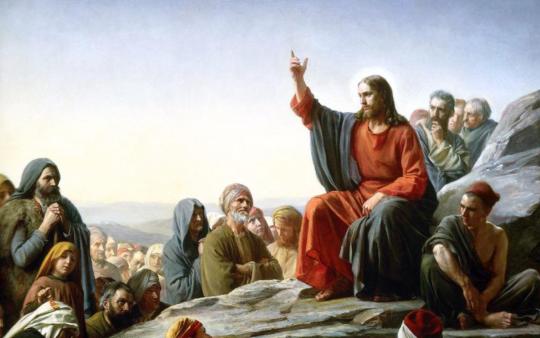
Readings of Monday, April 16, 2024
Reading 1
ACTS 7:51—8:1A
Stephen said to the people, the elders, and the scribes:
“You stiff-necked people, uncircumcised in heart and ears,
you always oppose the Holy Spirit;
you are just like your ancestors.
Which of the prophets did your ancestors not persecute?
They put to death those who foretold the coming of the righteous one,
whose betrayers and murderers you have now become.
You received the law as transmitted by angels,
but you did not observe it.”
When they heard this, they were infuriated,
and they ground their teeth at him.
But Stephen, filled with the Holy Spirit,
looked up intently to heaven and saw the glory of God
and Jesus standing at the right hand of God,
and Stephen said, “Behold, I see the heavens opened
and the Son of Man standing at the right hand of God.”
But they cried out in a loud voice,
covered their ears, and rushed upon him together.
They threw him out of the city, and began to stone him.
The witnesses laid down their cloaks
at the feet of a young man named Saul.
As they were stoning Stephen, he called out,
“Lord Jesus, receive my spirit.”
Then he fell to his knees and cried out in a loud voice,
“Lord, do not hold this sin against them”;
and when he said this, he fell asleep.
Now Saul was consenting to his execution.
Responsorial Psalm
PS 31:3CD-4, 6 AND 7B AND 8A, 17 AND 21AB
R./ Into your hands, O Lord, I commend my spirit.
or:
R./ Alleluia.
Be my rock of refuge,
a stronghold to give me safety.
You are my rock and my fortress;
for your name’s sake you will lead and guide me.
R./ Into your hands, O Lord, I commend my spirit.
or:
R./ Alleluia.
Into your hands I commend my spirit;
you will redeem me, O LORD, O faithful God.
My trust is in the LORD;
I will rejoice and be glad of your mercy.
R./ Into your hands, O Lord, I commend my spirit.
or:
R./ Alleluia.
Let your face shine upon your servant;
save me in your kindness.
You hide them in the shelter of your presence
from the plottings of men.
R./ Into your hands, O Lord, I commend my spirit.
or:
R./ Alleluia.
Gospel
JN 6:30-35
The crowd said to Jesus:
“What sign can you do, that we may see and believe in you?
What can you do?
Our ancestors ate manna in the desert, as it is written:
He gave them bread from heaven to eat.”
So Jesus said to them,
“Amen, amen, I say to you,
it was not Moses who gave the bread from heaven;
my Father gives you the true bread from heaven.
For the bread of God is that which comes down from heaven
and gives life to the world.”
So they said to Jesus,
“Sir, give us this bread always.”
Jesus said to them, “I am the bread of life;
whoever comes to me will never hunger,
and whoever believes in me will never thirst.”
0 notes
Text


Today’s Reflection
In our gospel today, the Jews, those people Jesus is speaking to, jumped to a conclusion and clung to the idea of Mana, which fed the exiles during their forty-year journey through the desert to the promise land. It is unfortunate, that they misunderstood what Manna was, for Manna could only satisfy one’s physical hunger but nothing more. Still, they demanded a sign, which they will never see. Because, even the sign they demanded, which was standing right in front of them in Jesus who is the bread was not enough. Yet, for those who take the time to listen and make an effort to understand, much as Stephen did in our first reading, will grow in their faith and find Jesus who is the sign that gives them eternal life.
Today’s Spiritual Links for April 16, 2024
National Eucharistic Review
Today’s Mas Readings
Today’s Reflection
Rosary
Liturgy of the Hours
New American Bible
Non-Scriptural Reading
Prime Matters
0 notes
Text

16th April >> Mass Readings (Except USA)
Tuesday, Third Week of Eastertide
(Liturgical Colour: White. Year: B(II))
First Reading
Acts of the Apostles 7:51-8:1
'Lord Jesus, receive my spirit'
Stephen said to the people, the elders and the scribes: ‘You stubborn people, with your pagan hearts and pagan ears. You are always resisting the Holy Spirit, just as your ancestors used to do. Can you name a single prophet your ancestors never persecuted? In the past they killed those who foretold the coming of the Just One, and now you have become his betrayers, his murderers. You who had the Law brought to you by angels are the very ones who have not kept it.’
They were infuriated when they heard this, and ground their teeth at him.
But Stephen, filled with the Holy Spirit, gazed into heaven and saw the glory of God, and Jesus standing at God’s right hand. ‘I can see heaven thrown open’ he said ‘and the Son of Man standing at the right hand of God.’ At this all the members of the council shouted out and stopped their ears with their hands; then they all rushed at him, sent him out of the city and stoned him. The witnesses put down their clothes at the feet of a young man called Saul. As they were stoning him, Stephen said in invocation, ‘Lord Jesus, receive my spirit.’ Then he knelt down and said aloud, ‘Lord, do not hold this sin against them’; and with these words he fell asleep. Saul entirely approved of the killing.
The Word of the Lord
R/ Thanks be to God.
Responsorial Psalm
Psalm 30(31):3-4,6,8,17,21
R/ Into your hands, O Lord, I commend my spirit.
or
R/ Alleluia!
Be a rock of refuge for me,
a mighty stronghold to save me,
for you are my rock, my stronghold.
For your name’s sake, lead me and guide me.
R/ Into your hands, O Lord, I commend my spirit.
or
R/ Alleluia!
Into your hands I commend my spirit.
It is you who will redeem me, Lord.
As for me, I trust in the Lord:
let me be glad and rejoice in your love.
R/ Into your hands, O Lord, I commend my spirit.
or
R/ Alleluia!
Let your face shine on your servant.
Save me in your love.
You hide them in the shelter of your presence
from the plotting of men.
R/ Into your hands, O Lord, I commend my spirit.
or
R/ Alleluia!
Gospel Acclamation
John 10:14
Alleluia, alleluia!
I am the good shepherd, says the Lord;
I know my own sheep and my own know me.
Alleluia!
Or:
John 6:35
Alleluia, alleluia!
I am the bread of life, says the Lord.
He who comes to me will never be hungry;
he who believes in me will never thirst.
Alleluia!
Gospel
John 6:30-35
It is my Father who gives you the bread from heaven.
The people said to Jesus, ‘What sign will you give to show us that we should believe in you? What work will you do? Our fathers had manna to eat in the desert; as scripture says: He gave them bread from heaven to eat.’
Jesus answered:
‘I tell you most solemnly,
it was not Moses who gave you bread from heaven,
it is my Father who gives you the bread from heaven,
the true bread;
for the bread of God
is that which comes down from heaven
and gives life to the world.’
‘Sir,’ they said ‘give us that bread always.’ Jesus answered:
‘I am the bread of life.
He who comes to me will never be hungry;
he who believes in me will never thirst.’
The Gospel of the Lord
R/ Praise to you, Lord Jesus Christ.
0 notes
Text
FRESH MANNA
CHRISTMASTIDE
Isaiah 7:14
Funny that the most celebrated event, occasion, holiday or whatever you call it, is not an actual Christian feast and is not found anywhere in the scriptures but has been made about the Lord Jesus Christ’s birth.
The Bible does not give the date of Jesus’ birth, nor does it say that we should celebrate his birthday.
Christmas is seen as an annual church festival celebrated on December 25 in honour of the birth of our Saviour Jesus Christ. It is a legal holiday in some nations of the world and is often celebrated with a particular church service and by giving special gifts, greetings, and hospitality.
Christmastide is more commonly known as the 12 Days of Christmas. It begins on Christmas Day, December 25th, and ends twelve days later. Most Christ-following denominations mark the end of the celebratory season on the celebration of the Epiphany.
Believers shouldn’t wait for a specific day annually to celebrate the Saviour. Celebrate Him daily for who He is and what He’s done for us. Christmas has become a worldwide drive to generate income boosting sales and festivities gaoler, rich, exotic, and expensive food and drinks, unnecessary party clothing and accessories, high-end drink-drive parties and expensive and mostly useless or inappropriate presents.
Gifts are exchanged to commemorate the gifts given to the infant Jesus by the three wise men from the East in Matthew 2:1–12.
It seems with each year that passes, Christmastide gets more extravagant and expensive and the reason for the season has slowly been swallowed up in all the trimmings of the festivities.
Nowhere in the Bible does God speak of making Christmas a part of the Christian faith, nor does He say to celebrate His Son's birth. He does tell us, though, not to add to His worship anything that is a tradition of the heathen. Such additions hinder rather than enhance our journey to God's Kingdom.
We are made to glorify God no matter what the occasion or season, and some of the Christmas carols have scriptures encouraging us to do just that in Luke 2:14. Christmastide should be another opportunity for us to glorify God by focusing on the meaning or the reason for the season. Our lives will sing of the glory of God when we intentionally seek His hand in our days.
Christmas commemorates the most momentous event in human history- the entry of God into the world in baby form.
Remember the life of Stephen in Acts 7 who gave to the poor and died for his faith, like him, we can be inspired to help those God has placed around us by giving and sharing what we have and telling them of Jesus, unlike the Christmas that has now turned into an enormously commercialized holiday.
2 Corinthians 10:5 tells us to take captive every thought, it’s easy to get caught up in the giving and receiving of presents of the season, they aren’t wrong to enjoy, but our focus must be on the true giver and provider of all things.
It’s very striking in Matthew 2 that the wise men sought to worship the newborn king, but the religious leaders did not. The pagan astrologers bowed their knees, but the religious leaders didn’t. As we glorify God, let's reset our hearts, guarding them against the danger of slipping into the commercial coma the season beckons us to. While we enjoy all the season has to offer, it’s important to stay focused and motivated by Christ. After all, He is the reason for the season! Let’s not forget that.
While hanging the lights, and ornaments, putting up the trees and wrapping presents, don’t forget to offer someone who hasn’t met the saviour the hope, joy and peace of the season to them wrapped in and with God’s love of Isaiah 9:6.
PRAYER: Lord, thank you for your gift of Jesus Christ and eternal life, may I learn to celebrate Jesus every day and not only on the 25 of December in Jesus’s name. Amen.
Shalom
WOMEN OF LIGHT INT PRAYER MIN.
#spotify#devotional#christianpost#women's ministry#biblestudy#biblestudy christianpost women's ministry#biblestudy christianpost 'women's ministry#conference#family#prayer meeting
0 notes
Text
Seventh-Day Fetishism, Redux
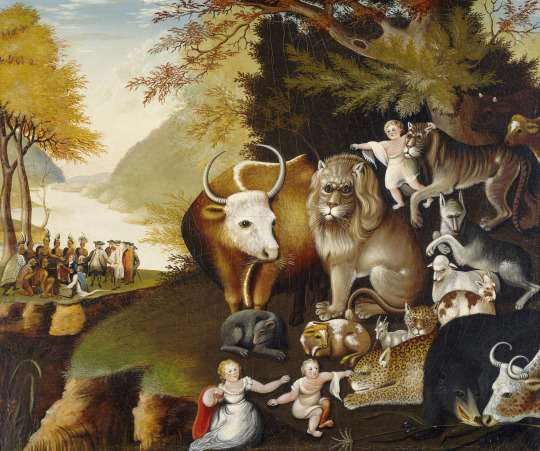
Too many Sabbatarians, I think, miss the reason for the Sabbath. And rather then try to discern the mind of God, and try to divine core principles, they've done what Pharisees throughout history have done - Obey the letter of God's Law without really trying to understand the why of it all.
Recently I received this thoughtful personal message -
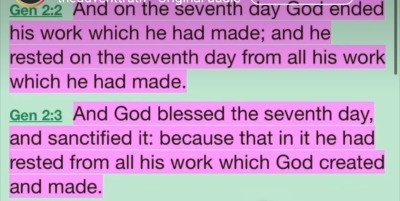
Notice the because - "in it He rested from all His work which God had created and made."
Compare that with the rationale found in the Commandments - "For in six days the LORD made heaven and earth, the sea, and all that in them is, and rested the seventh day: wherefore the LORD blessed the sabbath day, and hallowed it."
Now I used to hate the glib responses to the holiness of the Sabbath as just, "a day off". But essentially, Sabbath and rest become intertwining themes that interpenetrate each other within the Bible. Father Stephen Freeman addresses this in his blog on occasion (1, 2).
And the "rest", as presented, isn't just a glib "rest", but a deeply sacramental Rest. The harvesting and eating of manna becomes ritualized (Exodus 16:20-26), as did the eating of the shewbread by the Priests (Leviticus 24:8-9). The Sabbath represented the covenant between the Israelites and God. Failure to rest on the Sabbath was deemed to be a breach of that covenant, and people who did so were put to death (Exodus 31:14, Numbers 15:32). There were harvest rituals that incorporated the Sabbath (Leviticus 23). But Sabbath became way more than a day -
Leviticus 23:10-11
Speak unto the children of Israel, and say unto them, When ye be come into the land which I give unto you, and shall reap the harvest thereof, then ye shall bring a sheaf of the firstfruits of your harvest unto the priest: And he shall wave the sheaf before the LORD, to be accepted for you: on the morrow after the Sabbath (Sunday) the priest shall wave it.
Leviticus 23:15-16
And ye shall count unto you from the morrow after the sabbath, from the day that ye brought the sheaf of the wave offering; seven sabbaths shall be complete: Even unto the morrow after the seventh sabbath shall ye number fifty days; and ye shall offer a new meat offering unto the LORD. (7 x 7 = 49+1 = Sunday, again.)
Leviticus 23:24
Speak unto the children of Israel, saying, In the seventh month, in the first day of the month, shall ye have a sabbath, a memorial of blowing of trumpets, an holy convocation. (I really do not know if the first day of the seventh month was always "the" Seventh-Day Sabbath, or just "a" sabbath. All I can find in online resources is that it's "New Years" day - which could be called the first day of the year, a sunday... I can also tell you that this "sabbath" doesn't divide easily out of the 207 days of the six months that precede it - even if you do something like 207+1).
Leviticus 23:32
Ninth day of the month from even to even… (9 isn't divisible by 7 or even 7+1.)
Leviticus 23:39
"Fifteenth day of the Seventh month…" (At least 15 is 7 x 2 + 1, Sunday, again.)
Leviticus 25:4
But in the seventh year shall be a sabbath of rest unto the land…" (So, now, every Seventh Year is to be ritualized as part of the Sabbath liturgical rest cycle.)
Leviticus 25:8-11
And thou shalt number seven sabbaths of years unto thee, seven times seven years; and the space of the seven sabbaths of years shall be unto thee forty and nine years. Then shalt thou cause the trumpet of the jubile to sound on the tenth day of the seventh month, in the day of atonement shall ye make the trumpet sound throughout all your land. And ye shall hallow the fiftieth year, and proclaim liberty throughout all the land unto all the inhabitants thereof: it shall be a jubile unto you; and ye shall return every man unto his possession, and ye shall return every man unto his family. A jubile shall that fiftieth year be unto you: ye shall not sow, neither reap that which groweth of itself in it, nor gather the grapes in it of thy vine undressed. For it is the jubile; it shall be holy unto you: ye shall eat the increase thereof out of the field. In the year of this jubile ye shall return every man unto his possession. (Compare this with Leviticus 23:15-16. 7 years x 7 years, plus 1, gives a Sunday Jubilee Sabbath year).
The whole Sabbath cycle is deeply ritualistic, liturgical, a symbol of Rest and of Covenant. I can't help but think that it is based upon a deeply intimate need of human nature. A Pharisaical approach would be to reduce "Sabbath" to a day, and call things done.
I honestly used to think that the whole eighth day rest argument by Sunday keepers was so much hokum - where did that 8th day come from? This blatantly cursory reading though has convinced me that the source of the Eighth Day Rest Cycle literally comes from early Christian reinterpretation of "Sabbath" to the week; in the same pattern as the Sabbatarian Liturgies as outlined in Leviticus 23:10-11, Leviticus 23:15-16, Leviticus 23:39, and Leviticus 25:8-11. I do wish I knew what Leviticus 23:24 and Leviticus 23:32 were all about though.
In the end, I really don't think that a specific day of the week should be a cross for any Christian to die upon. Rather one should use their daily, weekly, monthly, yearly, and even longer worship cycles to delve into the patterns of life, of community, of thanksgiving, and of restoration. The (indefinite article) sabbath is a Rest, a Deep Rest with the creator of the universe and with his creation. If you are limiting, fetishizing yourself to one specific day; establishing lists of do's and don'ts out of some personal idea of rule-keeping around that day, all for an imagined Glory to God - I think your priorities are off, and you are wandering in delusion.
Mark 2:27
And he said unto them, The sabbath was made for man, and not man for the sabbath.
Colossians 2:16
Let no man therefore judge you in meat, or in drink, or in respect of an holy day, or of the new moon, or of the sabbath days.
Glory to God.
May he have mercy upon me.
0 notes
Text
The following reflection is courtesy of Don Schwager © 2023. Don's website is located at Dailyscripture.net
Meditation: Why did Jesus call himself the bread of life? The Jews understood that God promised them manna from heaven to sustain them on their journey to the promised land. Bread is the very staple of life. We could not live without food for very long. Bread sustains us. But what is life? Jesus clearly meant something more than mere physical existence. The life Jesus refers to is connected with God, the author of life. Real life is a relationship with the living God, a relationship of trust, love, obedience, peace, and joy. This is what Jesus makes possible for us - a loving relationship with God who created us for love with him. Apart from Jesus no one can enter that kind of life and relationship. Are you satisfied with mere physical existence or do you hunger for the abundant life which Jesus offers?
Jesus makes three claims here. First he offers himself as spiritual food which produces the very life of God within us. Second, he promises unbroken friendship and freedom from the fear of being forsaken or cut off from God. Third, he offers us the hope of sharing in his resurrection. Jesus rose physically never to die again. Those who accept Jesus as Lord and Savior will be bodily raised up to immortal life with Jesus when he comes again on the last day. Do you know the joy and hope of the resurrection?
"Lord Jesus Christ, your death brought life and hope where there was once only despair and defeat. Give me the unshakable hope of everlasting life, the inexpressible joy of knowing your unfailing love, and the unwavering faith and obedience in doing the will of our Father in heaven."
The following reflection is from One Bread, One Body courtesy of Presentation Ministries © 2023.
the people of the word
“The members of the church who had been dispersed went about preaching the word.” —Acts 8:4
The Jewish people loved God’s Word. God called them to meditate on it day and night (Jos 1:8; Ps 1:2). They considered it more precious than thousands of gold and silver pieces (Ps 119:72).
Christians were likewise wholeheartedly devoted to God’s Word. After Jesus spent the day of His Resurrection teaching the Bible while walking seven miles in the afternoon (Lk 24:27) and for several hours in the evening (Lk 24:45), the early Christians got the message that God’s Word was extremely important.
From the moment the Church began at Pentecost, the members of the Church devoted themselves to learning, living, and teaching God’s Word (Acts 2:42). The apostles concentrated on “the ministry of the Word” (Acts 6:4) to the point that they were repeatedly thrown in jail for proclaiming it (see Acts 5:42). St. Stephen proclaimed God’s Word so boldly and courageously that he became the first martyr (Acts 7:2ff). St. Philip, the deacon, preached the Word even as he was escaping persecution (Acts 8:4-5). Moreover, the Spirit even told Philip to run up to a stranger from Ethiopia and teach God’s Word (Acts 8:29ff). The first believers ever to be called “Christians” were only given that name after a year of intensive Bible study (Acts 11:26). The members of the church at Beroea welcomed the Word with great enthusiasm and studied God’s Word each day (Acts 17:11).
The spirit of the early Church is well expressed by St. Jerome: “Ignorance of the Scriptures is ignorance of Christ” (Catechism of the Catholic Church, 133).
Prayer: Father, may our hearts burn as the risen Jesus interprets the Scriptures for us this Easter season (see Lk 24:32).
Promise: “No one who comes will I ever reject, because it is not to do My own will that I have come down from heaven, but to do the will of Him Who sent Me.” —Jn 6:37-38
Praise: Although in a new place and with a new job, Robert continued to spread the Good News to those he met.
Reference:
Rescript: "In accord with the Code of Canon Law, I hereby grant the Nihil Obstat for the publication One Bread, One Body covering the time period from April 1, 2023 through May 31, 2023. Reverend Steve J. Angi, Chancellor, Vicar General, Archdiocese of Cincinnati, Cincinnati, Ohio September 21,, 2022"
The Nihil Obstat ("Permission to Publish") is a declaration that a book or pamphlet is considered to be free of doctrinal or moral error. It is not implied that those who have granted the Nihil Obstat agree with the contents, opinions, or statements
0 notes
Video
youtube
Gist of Gospel and Predictions:- Israel will attack Iran on 14/05/2023 w... Gist of the Gospel and Predictions:- Israel will attack Iran on 14/05/2023 which will lead to the Atomic War on 14/11/2023 or soon after. https://youtu.be/QZk2kmeV_Jo Hi Brother, I am from the Punjab where the second coming of Jesus in the name of Satguru = Christ Nanak took place in 1469 among the Kings and Emperors of Darkness the people of the Khatri tribe who didn’t hide their tribal identity under the spiritual self-Hindu as the Chosen people had done under the spiritual self-Jew. By doing so, the Chosen Elite people became the sons of the most powerful Satan Al-Djmar Al-Aksa, the religious fanatics that wanted to kill Saint Paul for exposing their hypocrisies or a set of blasphemies. Angel Stephen in his long speech to the Synhedrion emphasised that Abraham was a Nobel Man brought from the Iraq area to settle in the Middle East as Adam, Sarah as Eve and he gave them the Promised Land as the Garden of Eden. But out of the 12 sons of Jacob, only Joseph was truthful Salt of Abraham whilst the rest of the eleven were telling lies and they were murderers –John 8v44. As soon as the eleven crook brethren sold Joseph as a slave to the Egyptian, there was none remained who was faithful to Abraham and Yahweh, the Lord of Nature at large. Now, Abraham is the father of the faithful and not the unfaithful super bastard fanatic devils – John 8v44. Yahweh protects and feed you so far you are faithful to your tribal father as the Egyptians were and not the super bastard unfaithful and Saltless people to Abraham and Yahweh. Joseph became prosperous under the protection and wisdom of Yahweh, the Lord of the Nature whilst the crook liars and murderers were dying of hunger. They had to leave the Promised Land that belonged to Abraham and take shelter in Egypt where their brother Joseph got them the best land to settle. But as the Pharaohs changed and became cruel, then Prophet Moses appeared among them and He brought them back to the lush green Promised Land as the faithful sons of Abraham and no more rift among the brethren under “Eros” or the snake was lifted up in the Wilderness where they ate Manna as compared with the most delicious food Jesus offered to them in the desert urging them to join hands with him by eating the flesh of Jesus or what came out of the mouth of Jesus, digest that over your heart with the Teeth of logical reasoning to Brew Logo = Oral Torah = His Word, the Tap-Root of the Tree of life, the holy scriptures = Written Torah. The Samaritans being the faithful sons of Abraham and Jacob, so they enjoyed the best fruit of the earth and their Rabbis were not divided as the blind guides of the crook Patriarchs. That is why he spiritual Doctor Christ Jesus took birth among the most spiritually sick clever and greedy people of the Judah tribe of king David, a Devta. That is why Jesus had to take a Virgin Birth among them and the First Proof of His Virgin Birth is his very name that the Angel proclaimed to Mary, “Yahshua”; made up of the two words, Yah = Yahweh and Shua = Shiva, the First born of Yahweh, the Second Adam. Thus, John, the Baptist, Prophet Elijah, the ousted out “Corner Stone” of the Temple took to wilderness as the people of the dominating tribe Judah killed a Cohen of the Levi tribe in the Temple for speaking out the Truth that a Jew is one who is inwardly spiritual and not physically outwardly a tribal self like Judah, Levi, etc. The dominating people of the Judah tribe didn’t like that and killed him. And so they killed Jesus, the Christ of Elohim for Preaching the Gospel, the Tap Root “Oral Torah”. Today, such unfaithful to Abraham and Yahweh, the Tares are getting bundled up in Israel Matt 13v24-30 for the Final Burning through Atomic War that is expected on 14/11/2023 or soon after. To err is human possessing the holy spirit of man called common sense whilst the Saints possessing the very Holy Spirit of God know the exact time. Watch my other attempts at prediction also. ATOMIC WAR COULD TAKE PLACE SOON AFTER 14/11/2023 – ISRAEL SHALL NOT CELEBRATE ITS 76TH BIRTHDAY. 14/05/1948 + 70 YEARS OF FULL PROTECTION TILL 14/05/2018 WHEN CHILD-LIKE DONALD TRUMP PRESSED THE TRIBULATIONS BUTTON BY PROCLAIMING JERUSALEM TO BE THE CAPITAL OF ISRAEL. THEN, AFTER FIVE YEARS OF TRIBULATIONS IN WHICH THE “TARES”, SALTLESS UNFAITHFUL TO ABRAHAM AND YAHWEH WILL BURN AND KILL EACH OTHER; HAMAS AND FATEH VS JEWS OUTWARDLY KILLED JESUS, SADDAM HUSSEIN, GADAFFI, ETC. INNOCENT PEOPLE OF THE ORDER OF CHRIST JESUS. THIS FIVE YEARS OF GRACE WILL END ON 14/05/2023 AND THE “JUDGEMENT ATOMIC WAR” IN WHICH 6 MONTHS WOULD BE OF YAHWEH, THE CONVENTIONAL WEAPONS AND THE 7TH MONTH, THE MIDDLE CANDLE OF THE MENORAH OF ELOHIM, ALLAH, .... Hitler and the British killed the Anti-Semitic sinner Jews outwardly of flesh unfaithful to Abraham and Yahweh, the “Saltless Tares” whilst Super Hitler Putin will deal with Blasphemer sons of Satan Al-Djmar Al-Aksa who destroyed Iraq, Libya and Syria, etc. https://youtu.be/GBbQAAj3l60
0 notes
Photo

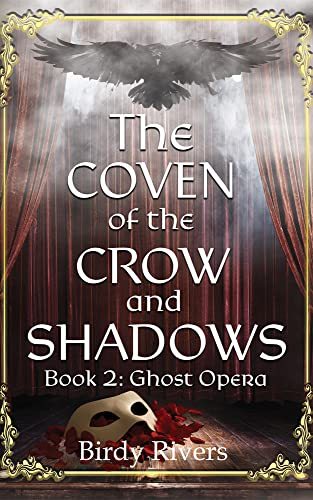

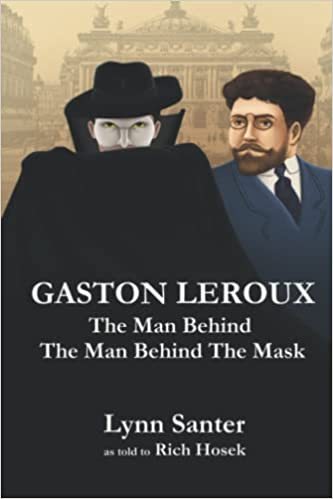




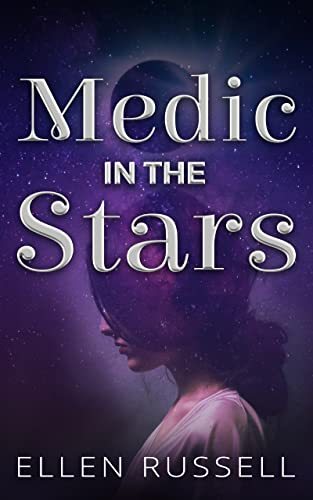

The summer is half gone but FULL of Phantom goodness nevertheless. Behold!
Alternatives by Manna Huizar is a sequel to the original story set in a slightly alternative universe (according to the author, but they don’t say what’s different so I guess we’ll all have to read to find out!). After the events of the main story, Erik flees France and has new adventures elsewhere with a new love interest.
The Forgotten Phantom by Kathryn Ann Kingsley is the Phantom’s entry in the Creature Feature series, a selection of romance novels based on romancing classic movie monsters! In it, Christine is an intrepid explorer, more like a ghost-hunter than her original role, and has been sent by her organization to investigate a hundred-year-old haunting in the basement of a crumbling opera house. There seems to be some suggestion that this is an actual ghost Phantom, and that he may be mistaking the Christine of this novel with another one he knew a very long time ago.
Gaston Leroux: The Man Behind the Mask by Lynn Santer & Rich Hosek is an unusual one - a fictionalized retelling/biography of Leroux’s life and career! It looks like it’ll come from the perspective of Leroux having actually met the Persian and received the Phantom’s story from him firsthand.
Ghost Opera by Birdy Rivers is part of a fantasy series about a young woman descended from gods and monsters who has been allowed to visit the human world for the first time, where she’s meant to remove the ghost haunting a local music academy. Of course, she has to go undercover, and of course, the school is putting on a very familiar musical by someone with very familiar initials, and of course she realizes that there’s something about her costar...
Ghostlight by Caitlin Du Bois is about a teenager named Claire, who achieves her dreams when she gets a part in the summer community musical and gains a musical mentor in a dashing adult, only to realize that things are not what she thought as his control over her begins to close in.
Medic in the Stars by Ellen Russell is the second book in a science fiction series, and revolves around a woman who has been kidnapped by members of an alien race. She finds herself in the care of the ship’s medic, a physically deformed man who feels it is impossible for him to ever find love, and romance begins to bloom. (This is our borderline entry this month, but I’m always living in hope of science fiction Phantoms...)
Mistress of Music by Evelyn Richardson is a period romance about a young opera singer desperate to make it who accidentally falls in love with the dashing young lord acting as the place’s patron instead.
Nocturne by Alyssa Wees is set in the early 1900s between World Wars and tells the story of an orphan, Grace, who hopes to be a ballerina during the depression and makes it thanks to the help of an enigmatic patron who supports her career but does it in a very mysterious manner.
Phantom Reflection by Kim Malinowski is definitely about the Phantom story, but that’s about all I can tell you. The blurb claims that it is a novel in verse and a retelling of the original story, and it’s only 82 pages in the ebook edition, so it’s probably not too long.
Pitch & Pace by Julia Blake follows opera singer Kit, recovering from a throat infection that may have ended her career, reconnecting with her childhood best friend but also suddenly thrust into a mystery revolving around several local murders and the sexy veterinarian in town.
Three Muses by Martha Anne Toll is set after the second World War and stars John, an opera singer who was forced to sing in concentration camps and struggles to perform now that he is free, and Katya, a ballerina trapped in a relationship with an abusive mentor. John one day receives an anonymous ticket to see Katya, and things begin to spiral from there.
Bonus round: we got us a fancy set of rereleases! Back in the day, C. David Stephens released a series of Phantom-based books under the names Angel of Music: The Enchanted Violin, Angel of Music: Erik, and Angel of Music: Raoul. Now we’ve got four new titles and spiffy updated descriptions to boot:
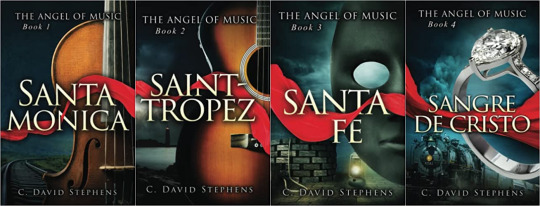
Santa Monica is set in the modern day and tells the story of an 11-year-old Christine, a homeless street performer who strives with her father to perform for enough money for food; when she meets the young Raoul, he helps them get off the street by hiring her father to give him violin lessons.
Saint-Tropez is the next book and begins with the now-teenage sweetheart separated and about to be reunited by Raoul inviting Christine to spend two weeks at his French chateau. Christine is excited to spend time with Raoul, but also meets a dangerous but interestingly mysterious boy named Erik at one of his parties.
Santa Fe follows with the death of Christine’s father and a summer with Christine and Raoul trying to recover from trauma on a ranch, only to have a mysterious intruder interrupt them. Meanwhile, Christine has started working backstage at the local opera house, which would be great except for whomever is harassing the singers and demanding she perform.
Sangre de Cristo rounds us up with Christine as a new ingenue superstar singing sold-out performances and attending a musical conservatory, and of course getting engaged to Raoul somewhere along the way. The main concern is that this ghost who keeps haunting her has crashed every OTHER event, so the wedding probably isn’t safe...
The series above, rebranded The Angel of Music with all-Spanish titles to tie it to its southwestern United States settings, appears to be the same series, at least nominally; I compared the opening text of Santa Monica against the opening text of The Enchanted Violin and they seem to be identical, although of course I can’t say for sure whether Stephens has done further editing and/or written more content for this release.
And that’s July, y’all!
#phantom of the opera#new phantom releases#c david stephens#kathryn ann kingsley#manna huizar#kim malinowski#lynn santer#rich hosek#birdy rivers#caitlin du bois#ellen russell#evelyn richardson#alyssa wees#julia blake#martha anne toll
51 notes
·
View notes
Photo

Strange #1 Carnage Forever variant cover by Francesco Manna.
62 notes
·
View notes
Text
My thank you and love letter to the Doctor Strange x Reader community...

It’s been a very long time. I’ve written for multiple fandoms for 8+ years now, and I was almost always left on the outside looking in, mainly because my creative choice was to fashion OFCs. The red-haired step-children of fan fiction. Still, I carried on, because it’s what my Muse directed, and the nature of the stories that are within me to tell. I like to think my work has steadily improved over the years.
And I get it- I really do. Most people want to see the ship of their heart, and that is most often with canon characters.
There’s tons of fantastic fic (and face it, not so good as well) out there that gives people exactly that. Are there fictions where the characters are bent and manipulated and made OOC for the sake of making them fit into the narrative the way the author wants them to. HELLS YES! And does it hurt to see the love and praise lavished on these pieces as though they are manna from heaven, while I still struggle to break a couple dozen notes of any kind, and mainly because I have the audacity to fill the written fantasies I offer with strong, original female characters? Not as much as it used to--but sometimes it still smarts.
But I think I’ve found my home at last. The Doctor Strange x Reader Insert community has truly made me feel welcome and embraced me in a way that I finally feel appreciated. And among peers. You lovely people are so key smash and enthusiastic and willing to share ideas and thoughts and advice, it’s like day and night to my old experiences (with one notable exception, because this blogger 🥰🥰 ALWAYS believed in my work and supported me without fail). I never got as many reblogs as I have since giving in to writing my female characters as Reader, and I want to thank you all for every single one of them. You all amaze me too--your imagination and enthusiasm, and daaaaaamn, how astoundingly prolific you are! My only gripe is with myself; why the hell can’t I keep up? I want to match you pace for pace, story for story, else I feel like I’m being left behind in the dust.
Anyway--and hand on heart--just know that I adore and appreciate you all, and you’ve given me the unexpected joy of having my own work greeted with kindness and enthusiasm for the first time in too many years! So please- do read on...and write on too!
PS The blogger I mentioned above is a fabulous author (and amazing friend) in her own right. Besides her canon compliant fics, she is the The Queen of Rarepairs, and has been known to fashion the occasional and delightful OFC when the spirit moves her. You can find her work on both her main blog and side blog- @strangelock221b @dreaminonao3 Please go give her works a looksee- her Doctor Strange pieces are true *chef’s kiss*, my favorites of which are Stephen x Darcy (omg, they are squee worthy and when I read them I simply pretend I’m Darcy) and Stephen x Pepper (face it, the Man falling and being in love is *sighs* DIVINE), and a newer series which she wrote to cheer me up, called The Countess and Her Defender on AO3. All my love to you, T! 💗
#trials and tribulations of a writer#other people's writing#doctor strange fanfiction#doctor strange fan fiction#stephen strange fan fiction#stephen strange x y/n#doctor strange x reader#stephen strange x reader#doctor strange x y/n.stephen strange x y/n#Defender Strange#Supreme Strange#Sinister Strange#Doctor Strange Supreme#Doctor Strange#Stephen Strange#Strangebatch#My Eternal Muse#Muse to oh so many
57 notes
·
View notes
Text
cute phrases to put on booty shorts:
- you do not recognize the bodies in the water
- brury regevoy
- a holding of envelope logistics
- system to contain unsustainable threats to life and existence
- reap what you sow
- did you know world renowned writer stephen king was once hit by a car? just something to consider
- big brozart is watching you
- a-p individuals do not use unless mandated
- yeah we’re totally going to hell for this
- perfectly legal, thank you very much
- big narf
- manna charitable official delegate
56 notes
·
View notes
Text

To thee, O Barnabas, we offer the gratitude of nations. Thou didst watch, O faithful Levite, beside the figurative sanctuary of the days of expectation, observing the coming of the Lord God, until at last the true ark, the Incarnate Word, having appeared in Sion, thou didst at once take thy place at his side, to defend and serve him, the ark of holiness, that had come to rally all nations, to give them the true manna, to establish amongst all the new covenant; this was to require from the sons of the Old Testament the sacrifice of the privileges that had been theirs since the first prevarication of the Gentiles. Though a member of the favoured tribe of Levi, thou was prompt to abandon its sacred titles, which thou didst recognize to have been but limited and now to be set aside; yea, outstepping mere precept, thou didst not hesitate to renounce all thy family possessions and give them up, together with thyself, to the Church yet in her infancy and scorned by the Synagogue. Therefore the Holy Ghost would not be outdone in generosity; to thee he reserved the signal privilege of presenting to the Gentiles their apostle. Saul was thy friend; blinded by the prejudices of his sect, he scorned to follow thine example; and the faithful trembled at his very name, seeing in him their most relentless persecutor. But silently thine intercession arose from the earth, and blending with that of Stephen, pleaded a strong prayer for the murderer. The hour of grace had sounded; and thou wast the first in Jerusalem to hear of the victory; on the strength of thy testimony alone, the terrified assembly of believers opened their doors to the recent convert.
6 notes
·
View notes
Text
Mesopotamian Service in the Modern World
I often mention that in Mesopotamian religions serving the Gods was of the utmost importance; we were their servants even if they treated us as caring parents. Idols were washed, bathed, entertained, fed meals, and given offerings by the people, all land was owned by the Gods. The State, be it a city or empire, was charged with making sure the Gods were correctly cared for and honored.
None of this really meshes with the modern world and I am a staunch believer in the separation of Church & State. So how does a modern Mesopotamian polytheist (or any ANE religion that had a similar philosophy) follow such cosmological requirements in the modern world?
Here is the conclusion I've come to.
One of the biggest things in ancient Mesopotamia from the 3rd millennium BCE (at least) all the way through the 1st millennium BCE there was an emphasis on law and order. An ordered society is the “plan” of the Gods, it is how they set up society to be. Following through with their plan by keeping the order is a way to “serve” them in the modern day.
“The gods were genuine and had instituted government on earth as a terrestrial extension of their own administration of the cosmos in such a view the earth was a divine estate and man it’s caretaker tending the land on the gods behalf […] indeed they would have believed— and their priests would have instructed them— that the service of the gods with humanity’s prime function.”
— Guide to Life in Ancient Mesopotamia by Stephen Bertman pp. 65
The idea of a god determining the `destiny' or `fate' (Sumerian nam- tar, Akkadian fimtu) of an individual was more a settling of certain potentialities than an absolute predestination of the future. There were certain `'plans' or '`designs'' behind the world and it was up to gods, kings and humanity at large to do their part to ensure the harmonious functioning of civilisation.
— Gods Demons and Symbols of Ancient Near East by Jermey Black and Antony Greene
“The only true sovereign state, independent of all external control, is the state which the universe itself constitutes, the state governed by the assembly of the gods. This state moreover is the state which dominates the territory of Mesopotamia; the gods own the land the biggest estates, in the country. Lastly since man was created especially for the benefit of the gods his purpose is to serve the Gods. Therefore no human institution can have its primary aim in the welfare of his own human members; it must seek primarily the welfare of the gods.”
— Before Philosophy by Thorkild Jacbsen
This is where modernity has to come in. Even if we wanted to produce some sort of welfare for the Gods above everything else, we no longer have a system of large temples around us to do so nor do we have a society that worships the Gods. Thus caring for “the order,” which the Gods desire, is a way to mitigate that.
The idea that law and justice are demanded by the Gods and instituted by us is shown in multiple ancient texts:
Code of Ur-Nammu: “After An and Enlil had turned over the Kingship of Ur to Nanna, at that time did Ur-Nammu, son born of Ninsun, for his beloved mother who bore him, in accordance with his principles of equity and truth… Then did Ur-Nammu the mighty warrior, king of Ur, king of Sumer and Akkad, by the might of Nanna, lord of the city, and in accordance with the true word of Utu, establish equity in the land.”
Code of Lipit Ishtar: “When Anu and Enlil had called Lipit-Ishtar, Lipit-Ishtar the wise shephard whose name had been pronounced by Nunamnir, to the princeship of the land in order to establish justice in the land, to banish complaints, to turn back enmity and rebellion by force of arms, and to bring well-being to the Sumerians and Akkadians, then I, Lipit-Ishtar, the humble shephard of Nippur, the stalwart farmer of Ur, who abandons not Eridu, the suitable lord of Erech, king of Isin, king of Sumer and Akkad, who am fit for the heart of Manna, established justice in Sumer and Akkad in accordance with the word of Enlil.”
A ruler must maintain justice and law within the lands they rule as required by the Gods. Which was also a convenient way to justify war for more land to rule for the sake of the Gods but that should stay a part of ancient history. 
(Quote within a quote) “The belief that oppression and injustice were followed by material misfortune is well attested in a document from Ashur-bäni-pal’s library, which contains a number of warnings to a king against injustice, and which unequivocally states that any act of that description would recoil upon himself or upon his land. The beginning of this tablet reads as follows:—
“If the king does not give heed to justice, his people shall be overthrown and his land shall be brought to confusion.
If he gives no heed to the law of his land, Ea, the king of destinies, shall change his destiny, and shall visit him with misfortune.
If he gives no heed to his nobles, his days shall (not) be long.
If he gives no heed to the wise-men, his land shall revolt against him.
If he gives heed to wisdom (?), the king shall behold the strengthening of the land.’
If he gives heed to the commands of Ea, the great gods shall endow him with true knowledge and discernment.
If he treats a man of Sippar with injustice and gives a harsh decision, Shamash, the judge of heaven and earth, shall give a harsh decision in his land, and shall appoint a just prince and a just judge in place of injustice.
If the men of Nippur come to him for judgment and he accepts gifts and treats them with injustice Bél, the lord of the world, shall bring a foreign foe against him and shall overthrow his army, and his prince and his leader they shall hunt as outcasts (?) through the streets.
If the men of Babylon take money with them and give bribes, and he favours the cause of (these) Babylonians and turns to (their) entreaty, Marduk, the lord of heaven and earth, shall bring his foe against him, and shall give his goods and his possessions to his enemy. And the men of Nippur, Sippar, or Babylon who do these things shall be cast into prison.”
In this tablet it is clearly stated that the gods would punish oppression and injustice with misfortune, and there is evidence of this belief in other Babylonian documents of a religious nature.”
— Leonard William King in Babylonian Religion and Mythology pp. 217-218
The following illustrates the idea that legal order and religion (specifically purification) are equal maintainers of existence.
“The one incantation which Utu is invoked emphasizes his judicial association, as does the Edhedu’anna hymn to his temple in Sippar. As text 48 puts it, Utu is the deity ‘who pronounces judgment, makes decisions (and) speaks the truth’ ( ‘di [kud-r]á g[a-e]š(8) bar zi-[d]a e’ ); similarly, the hymn describes him as one ‘who pronounce his judgment where the sun rises’ ( ‘di kud-ru ki-u(4)-è’ ).
A broad distinction can be suggest between roles and incantations of deities with judicial associations, that is primarily Utu, and deities with aqueous associations, that is Enki, Nanše, and Ningirim. In the case of the former it is envisaged that suffering in the sense of divine punishment of transgression will be avoided by release through legal acquittal, in the case of the latter through the use of purification. However, as is shown in the hymn to Nanše this distinction is not absolute. Further evidence of the close relationship between the two roles is provided by the Enhedu’anna hymn cycle which associates Utu with Enki, describing the latter’s temple as founded ‘in your place of calling to Utu’ ( ‘ki (^d)utu-ta gù-dé-za’ ), A description possibly related to the latter attested ki-(^d)utu-kam incantations.
Incantations in the Old Babylonian provide further evidence of association between Utu and Enki, for example one refers to ‘Utu rising from the agrun’ ( ‘(^[d])utu agrun-ta è-a-ni’ ), possibly alluding to the solar cycle, while another praises the reed as follows:
From heaven you shine from the underworld you shine
From heaven and the underworld you sparkle
From heaven you bring the order of Utu
From the underworld you perfect the hand-washing of Enki
In addition to emphasizing the closeness of the connection between order and purification, this passage associates the two deities with the two divine domains featured in cosmic mediation with Enki representing the underworld and Utu heaven.”
—Deliver Me from Evil Mesopotamian incantations 2500-1500 BC hy Graham Cunningham pp. 55
The idea that upholding order is not just legal but also includes social norms is shown in this passage
(also quote within quote) “From a series of magical incantations we learn that a wrong committed by a man against his neighbour carried with it a punishment no less severe than that which accompanied any offence against a ceremonial code. The various sins which a man might commit are enumerated in the form of questions, and the following extract will serve to indicate their general character:-
“Has he estranged the father from his son
Has he estranged the son from his father
Has he estranged the mother from her daughter
Has estranged the daughter from her mother
Has he estranged the mother-in-law from her daughter in-law
Has he estranged the daughter-in-law from her mother-in-law
Has he estranged the brother from his brother
Has he estranged the friend from his friend
Has he estranged the companion from his companion
Has he refused to set a captive free, or has he refused to loose one who was bound
Has he shut out a prisoner from the light
Has he said of a captive ‘Hold him fast,’ or of one who was bound has he said, ‘Strengthen his bonds!
Has he committed a sin against a god, or has he committed a sin against a goddess
Has he offended a god, or has he held a goddess in light esteem Is his sin against his own god, or is his sin against his own goddess
Has he done violence to one older than himself, or has he conceived hatred against an elder brother
Has he held his father and mother in contempt, or has he insulted his elder sister
Has he been generous in small things, but avaricious in great matters?
Has he said ‘yea’ for‘nay’? […]
Has he spoken of unclean things, or [has he counselled] disobedience
Has he uttered wickedness
Has he used false scales
Has he accepted a wrong account, or has he refused a rightful sump
Has he disinherited a legitimate son, or has he recognized an illegitimate son
Has he set up a false landmark, or has he refused to set up a true landmark
Has he removed bound, border, or landmark
Has he broken into his neighbour’s house
Has he drawn near his neighbour’s wife
Has he shed his neighbour’s blood
Has he stolen his neighbour’s garment"
— Leonard William King in Babylonian Religion and Mythology pp. 218-220
These are the social norms of Babylonian scribes who wrote this. In our modern age we should uphold modern social norms we see as just. Examples: freedom of speech, listening to one another, actions which differ from culture to culture such as bowing or saying please & thank you. Things of that nature both large and small.
I am not saying be behaviorally conservative and never challenge injustices or norms (like the norm of “one man one women”) as shown in the quotes injustice must be changed. I am only stating that maintaining “order” is a primary responsibility of Mesopotamian society and thus religion. This does not mean activism is going against the Gods. Protesting and activism for reforms and the rights of others makes our society better for all of us, and in that way brings better order— something the Gods desire. [This has been edited to reflect today's continued lost of freedoms]
In the modern world serving the Mesopotamian Gods is done by maintaining the way they desire the world to be— by conducting yourself in an orderly way and helping maintain an orderly and just society, for examples:
Uphold just laws.
Follow decent social norms
Foster healthy relationships
Contribute to society in whatever capacity you can, if you can
Cherish the wellbeing of other people
Protest, sign petitions, spread the word, fundraise, give to charity, be a member of organizations, lobby against injustice, vote, etc. Making our society better is a way to serve people as a whole, to order our society more fairly, with true democracy & freedom, and thus serve the Gods. [Also edited to reflect todays's continued loss of freedom]
Learn about things and expand your understanding
Numerous things can be added to this list
Note: If you are a Mesopotamian Polytheist...
It is required that you give praise to the Gods. Which could be simple "You are lovely Diĝirene" or something more
It is also necessary that you give food/liquid offerings in Revivalism & reconstructionism at some point when you can manage it, because of how engrained it was in Mesopotamia. "Following the order" doesn't negate that. I have tried to give ways to do this for those of us with the lowest spoons or who have to maintain the upmost secrecy of our religion. In my eyes—if your only capability is—saying their names as you sip a drink then that can be an offering, that is doing your best.
I've often seen questions about "can I ask a god for X" or "how often can I ask the gods for things." Because the order of society is set out by the Gods and they prefer to see things conducted in an orderly way asking them for help in all matters, while maintaining respect, is a fundamental aspect of the religion and not being “whiny,” or “bothering them.”
-
I call this "nam theory" or at least tagged it that and I'll eventually get around to reposting that info....... at some point... maybe
10 notes
·
View notes